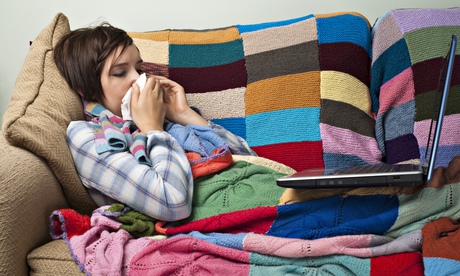
Everyone knows the major side effect of Googling your symptoms: a terrible case of hypochondria. Suddenly your headache becomes a brain tumour and your cough a sign of cancer. So we should all walk away from our keyboards, right?
Not so, say some doctors, and with good reason. Last week, a grieving mother told reporters that her daughter – who feared that her rare form of liver cancer (fibrolamellar hepatocellular carcinoma) was returning – was told to “stop Googling” by her doctors. Bronte Doyne had already had part of her liver removed after being diagnosed in 2011. When she felt her symptoms coming back, she researched the condition and found there was a high chance the illness would recur. Doctors dismissed her fears, and she died in March 2013. The NHS trust responsible for her treatment admitted they needed to “embrace the internet age”.
Craig Seymour, a London GP agrees. He says that most doctors welcome a patient who is well informed. But a critical eye is vital when dealing with online information. Here are six rules for Googling your symptoms safely:
1. Don’t actually Google.
That’s madness. Instead, Seymour suggests using reputable websites such as NHS Choices, which has a “symptom checker”, or patient.info. Charities and associations for specific conditions are also a good information source, he adds. For instance, check the Alzheimer’s Society website, alzheimers.org.uk, for information on dementia. And if in doubt, NHS England has a list of certified organisations to consult when looking for accurate information.
2. Try to be specific.
Vague search terms will result in frightening answers, says Seymour – and practically any symptom can be read as a sign for cancer or some other horrible illness.
3. Try not to worry.
Rare conditions are rare, and minor symptoms often resolve themselves in time. If you have more worrying symptoms, including bleeding from anywhere (unless you have haemorrhoids), or if your symptoms are changing or progressing, then visit your GP.
4. Try going offline.
Pharmacists are medically trained and you don’t need an appointment to get their advice, points out Dr Hamed Khan. Friends and family might also be able to offer sensible help with minor illnesses such as coughs and colds.
5. Be open to being wrong.
When you see your GP be open to a discussion about the research you have done – your symptoms may have other causes, says Seymour, and other treatments may be more appropriate.
6. Don’t hand over money.
Or at least, don’t buy tests or medicines from websites without checking with your GP beforehand. And definitely don’t treat yourself without checking with your doctor first. “I just had a patient today with diarrhoea who thought drinking Coca-Cola would help her,” says another GP. “If anything it made things worse.”

